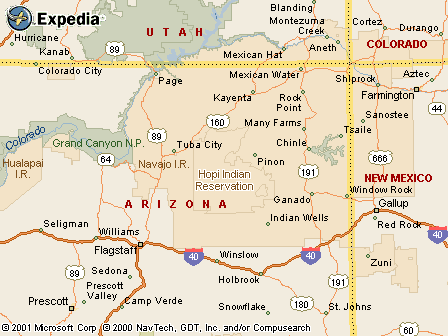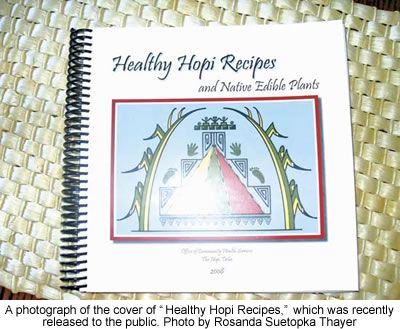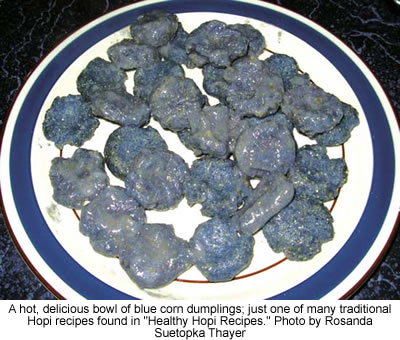 |
Canku Ota
|
 |
|
(Many Paths)
|
||
|
An Online Newsletter
Celebrating Native America
|
||
|
March 1, 2009 - Volume
7 Number 3
|
||
|
|
||
|
Hopi Cookbook Focuses
On Traditions Of Food
|
||
|
by Rosanda Suetopka
Thayer, The Navajo Hopi Observer
|
||
|
credits: Photos by Rosanda
Suetopka Thayer, The Navajo Hopi Observer
|
|
"Healthy Hopi Recipes" helps the larger community understand more about Hopi traditional foods, appreciating spirituality and special techniques, best practices in both growing, gathering crops as well as enhancing and sustaining transfer of traditional customs in Hopi food exchange during ceremonies.
The first cycle of project funding (about $30,000) paid for interviews combined with census data of 100 Hopis from the reservation area to gather information on why and how often traditional Hopi dishes were prepared in an average Hopi household. Additional information that proved extremely valuable in assessing how and when traditional foods were utilized is that of the 1,515 families living on the reservation who were surveyed, 574 were headed by single women. About 260 of those single women households were also listed as living below poverty level, but still deeply valued traditional food as important and necessary for appropriate cultural participation.
Special ceremonial foods at births, initiations and weddings along with the knowledge of how they are prepared are still seen as extremely important and highly valued. Food gathering and preparation also identifies various rites of passage for Hopi womanhood. Traditional value was also placed on the acknowledgement that the Creator provides such nourishment and that respect must be given for that food. Food is also seen as a medicine and should be shared. With corn as the main basic food for Hopi, there are numerous ways it can be prepared, not just for ceremonial purposes, but for everyday consumption. Piki, pikami, paatsami (hominy), somiviki, tsukuviki, povolpiki, wutaqa and kutuki...this is just a sampling of how varied the preparation methods of corn can be. Corn that is ground both coarsely and finely is used for "hooma" in ceremonies and as corn meal for special ceremonial food preparation. Both blue and white varieties of corn can be used. Care and respect must also be thought of when using these foodstuffs that honors your clan spirit and the sun. Hopis are mindful to eat whatever is prepared without criticism, and that leftover food should not be thrown into the trash. If there are leftovers, they are given to the animals. Nothing is wasted. There are continued Hopi reminders that food should never be prepared when angry and that sharing food generously is seen as an important life skill. Finally, that appreciation for the food and the food preparer should always be acknowledged. In the first of a series of public presentations by this cookbook partnership group, a workshop was held at the Hopi Wellness Center on Jan. 27 to over 100 attendees. The 2 1/2 hour presentation discussed the history of the Hopi cookbook project, health benefits of traditional foods by Kassondra Yaiva and Valerie Nuvayestewa and a cooking demonstration and sampling of one of the cookbook recipes by Iva Honyestewa and Harrissa Koiyaquaptewa. Honyestewa was part of the Hopi Pu'tavi, Inc's group partnership. Pu'tavi was responsible for applying for the grant funding that made this cookbook revision possible. Grant funding itself came from the Native Peoples Technical Assistance Office at UA under the direction of Claudia Nelson and Dr. Jay Strauss of the Native American studies program. It's only been within the last 30 years that Hopis and most Native communities have been plagued by diabetes, high blood pressure and other heart related diseases. Many now know that eating processed non-traditional foods as well as lack of daily exercise is the culprit. By utilizing this new cookbook, everyone can get a heads up on learning new cultural plant knowledge, eating better without extra salt or sugar, and helping to sustain Hopi cultural tradition. The next community workshop will be held March 16 from 5:30 to 8 pm at the Upper Village Elderly Center. Participants can receive a free copy of the cookbook by participating in the evening session For more information call Bea Norton at Hopi Community Health Services at (928) 737-6000 |
 Hopi Indian Reservation, Arizona map |
www.expedia.com |
|
|
||
|
|
||
| Canku Ota is a free Newsletter celebrating Native America, its traditions and accomplishments . We do not provide subscriber or visitor names to anyone. Some articles presented in Canku Ota may contain copyright material. We have received appropriate permissions for republishing any articles. Material appearing here is distributed without profit or monetary gain to those who have expressed an interest. This is in accordance with Title 17 U.S.C. Section 107. | ||
|
Canku Ota is a copyright ©
2000, 2001, 2002, 2003, 2004, 2005, 2006, 2007, 2008, 2009 of Vicki
Barry and Paul Barry.
|
||
 |
 |
|
|
The "Canku
Ota - A Newsletter Celebrating Native America" web site and
its design is the
|
||
|
Copyright ©
1999, 2000, 2001, 2002, 2003, 2004, 2005,
2006, 2007, 2008 of Paul C.
Barry.
|
||
|
All Rights Reserved.
|
||
 HOPI
RESERVATION, Ariz. - A newly revised Hopi cookbook - a partnership
project between the Community Health Program at the Hopi Tribe,
the Hopi Lavayahi program, Hopi Range Management program, Hopi Pu'tavi
Project, Inc, Native Peoples Technical Assistance Office at University
of Arizona (UA), North Central Regional Center for Rural Development
(NCR-CRD) at Iowa State University and UA's Cooperative Extension
Program at the Hopi Tribe - was unveiled to the public last week.
HOPI
RESERVATION, Ariz. - A newly revised Hopi cookbook - a partnership
project between the Community Health Program at the Hopi Tribe,
the Hopi Lavayahi program, Hopi Range Management program, Hopi Pu'tavi
Project, Inc, Native Peoples Technical Assistance Office at University
of Arizona (UA), North Central Regional Center for Rural Development
(NCR-CRD) at Iowa State University and UA's Cooperative Extension
Program at the Hopi Tribe - was unveiled to the public last week. For
Hopis, food represents a wide variety of traditional custom observation
as well as basic life sustenance, such as transfer of culture.
For
Hopis, food represents a wide variety of traditional custom observation
as well as basic life sustenance, such as transfer of culture.